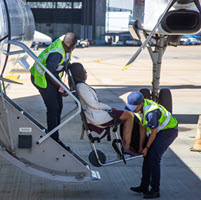Disabled Passengers' Rights: Dawn of a New Era or More of the Same?
- Written by Roberto Castiglioni
 For decades, disabled passengers have encountered numerous obstacles when travelling by air, ranging from insufficient assistance at airports to the mishandling and damage of crucial mobility equipment. Many individuals with disabilities have reported experiences of discrimination, neglect, and a lack of understanding from airline staff, leading to significant stress and challenges during their travels.
For decades, disabled passengers have encountered numerous obstacles when travelling by air, ranging from insufficient assistance at airports to the mishandling and damage of crucial mobility equipment. Many individuals with disabilities have reported experiences of discrimination, neglect, and a lack of understanding from airline staff, leading to significant stress and challenges during their travels.
Although existing regulations aimed at safeguarding the rights of disabled individuals, such as the Air Carrier Access Act in the United States, enforcement of these laws has often been inconsistent. This lack of accountability has resulted in repeated incidents that highlight systemic shortcomings in the air travel industry’s treatment of disabled passengers.
However, recent legislative developments and advocacy efforts indicate a potential turning point. Authorities and organisations are beginning to push for stronger regulations and more straightforward guidelines that ensure airline compliance and genuine accountability for infractions. These changes could mark the beginning of a new era in which disabled passengers receive the respect and assistance they rightfully deserve, ultimately transforming the air travel experience from one of frustration and hardship to one of inclusivity and support.
Persistent Challenges and Unenforced Laws
In the UK, the Equality Act 2010 requires "reasonable adjustments" to accommodate disabled individuals, including in the transportation sector. However, the implementation of these provisions is often inconsistent. Additionally, legislation such as UK1107/2006 outlines the rights of disabled individuals travelling by air.
A report released in 2025 by the Commons Transport Select Committee described the accessibility issues faced by disabled individuals in transport as a "national embarrassment." This report highlights serious concerns, such as wheelchair users being left on planes and taxi drivers declining service to passengers with guide dogs. It emphasises the need for accessibility to be recognised as a fundamental human right and calls for a new enforcement framework to protect the rights of disabled travellers.
Notable cases demonstrate these systemic shortcomings. For instance, BBC journalist Frank Gardner, who uses a wheelchair, has experienced being stranded on planes due to insufficient assistance. Similarly, passengers like Suzanne Croft have reported distressing experiences of waiting long periods for support, leading to feelings of humiliation and trauma.
Airlines for America's Legal Challenge
The U.S. enforces the Air Carrier Access Act (ACAA) of 1986, which prevents discrimination against passengers with disabilities. In December 2024, the Department of Transportation introduced a new regulation titled "Ensuring Safe Accommodations for Air Travellers with Disabilities Using Wheelchairs." This regulation aims to strengthen protections for disabled travellers.
However, in March 2025, Airlines for America, an organization representing major U.S. airlines, filed a lawsuit challenging this regulation, expressing concerns over the proposed requirements. The rule intends to ensure that airlines provide safe and respectful assistance to passengers with disabilities and mandates that airline staff undergo annual hands-on training.
Transportation Secretary Pete Buttigieg highlighted the importance of these measures, stating that they are designed to enable passengers using wheelchairs to travel safely and with dignity. The legal action taken by Airlines for America raises significant questions about airlines' commitment to supporting and protecting the rights of disabled travellers.
Signs of Progress and Advocacy
Despite facing numerous obstacles, there are encouraging developments for disabled travellers. In the UK, former Paralympic champion Baroness Tanni Grey-Thompson has been appointed to lead a dedicated task force to enhance air travel experiences for passengers with disabilities. This group will collaborate closely with the aviation industry to formulate practical solutions for several pressing issues: long delays in assisting at airports, the frequent mishandling of wheelchairs, and the inadequate availability of accessible facilities throughout the travel journey.
Moreover, initiatives like Rights on Flights,which emerged in response to troubling incidents involving damaged wheelchairs, are actively advocating for significant improvements in the treatment of disabled passengers. These campaigns stress the importance of training airline staff to ensure they are equipped to meet the diverse needs of individuals with disabilities, and they promote the design of more accessible cabins that consider the unique requirements of these travelers. By addressing these critical areas, stakeholders aim to foster a more inclusive and supportive air travel environment for all.
Conclusion: A Turning Point or Continued Struggle?
The ongoing challenges faced by disabled passengers, along with new initiatives being introduced, create a complex situation. While there are laws meant to protect the rights of disabled travelers, they aren't always enforced properly, leading to ongoing issues. On the bright side, there is increasing support from advocates, growing public awareness, and new government efforts that could lead to stronger protections.
Key legal cases, like the one brought by Airlines for America, will play a crucial role in deciding whether we are on the verge of significant improvements for disabled passengers or if things will stay the same as they have been for years. It's important for everyone—advocates, government, and the public—to keep working together to make sure the rights of disabled travelers are not just acknowledged but truly respected.










